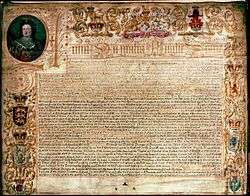1706 in Scotland
Events from the year 1706 in the Kingdom of Scotland.
| |||||
| Centuries: |
| ||||
|---|---|---|---|---|---|
| Decades: |
| ||||
| See also: | List of years in Scotland Timeline of Scottish history 1706 in: England • Wales • Ireland • Elsewhere | ||||
Incumbents
- Monarch – Anne

The Treaty of Union
Law officers
- Lord Advocate – Sir James Stewart
- Solicitor General for Scotland – William Carmichael
Judiciary
- Lord President of the Court of Session – Lord North Berwick
- Lord Justice General – Lord Tarbat
- Lord Justice Clerk – Lord Ormiston
Events
- April – commissioners assemble in London to agree a Treaty of Union between Scotland and England.
- 22 July – Treaty of Union agreed in London.[1]
- c. September – Daniel Defoe is sent to Edinburgh as an English government agent to promote ratification of the Treaty of Union.
- 3 October – opening of the Parliament of Scotland which will debate the Union.
- 19 October – an Edinburgh mob opposed to the Union threatens the Lord Provost.[2]
- 4 November – the Parliament of Scotland votes in favour of the Union with England Act by 116 votes to 83.[3]
- 6 November – a Glasgow mob opposed to the Union threatens the Lord Provost.[2]
- 20 November – a copy of the Treaty of Union is burnt publicly in Dumfries.[2]
- Lord Archibald Campbell is created 1st Earl of Ilay.
Births
- 1 April – Alexander Boswell, Lord Auchinleck judge (died 1782)
- date unknown
- James Abercrombie British Army general (died 1781)
- Walter Goodall, writer (died 1766)
- John Maule, Member of the Parliament of Great Britain (died 1781)
- William Stewart, Member of the Parliament of Great Britain (died 1748)
Deaths
- 25 August – Lord John Hay, soldier (born c. 1668)
- date unknown – Sir John Hay of Alderston, 1st Baronet
The arts
- A Choice Collection of Comic and Serious Scots Poems both ancient and modern, by several hands edited by James Watson begins publication in Edinburgh.[4]
gollark: Too bad.
gollark: It doesn't. It obeys the same rules as humans.
gollark: Humans are better at this, with a little practice.
gollark: v1 literally had to have a hardcoded patch to stop it not noticing instant loss/win situations.
gollark: ?????
See also
References
- Palmer, Alan; Veronica (1992). The Chronology of British History. London: Century Ltd. pp. 204–205. ISBN 0-7126-5616-2.
- "Notable Dates in History". The Flag in the Wind. The Scots Independent. Archived from the original on 26 January 2016. Retrieved 1 March 2016.
- McLean, Iain; McMillan, Alistair. State of the Union: Unionism and the Alternatives in the United Kingdom since 1707. Oxford University Press. ISBN 0-19-925820-1. Retrieved 6 January 2008.
- "Ramsay, Allan (1686–1758)". The Burns Encyclopedia. Archived from the original on 21 July 2009. Retrieved 2009-07-01.
This article is issued from Wikipedia. The text is licensed under Creative Commons - Attribution - Sharealike. Additional terms may apply for the media files.
